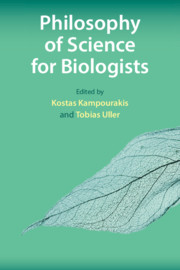Book contents
- Philosophy of Science for Biologists
- Philosophy of Science for Biologists
- Copyright page
- Contents
- Contributors
- Preface
- 1 Why Should Biologists Care about the Philosophy of Science?
- 2 What Constitutes an Explanation in Biology?
- 3 What Is Biological Knowledge?
- 4 What Is the Nature of Theories and Models in Biology?
- 5 How Are Biology Concepts Used and Transformed?
- 6 Why Does It Matter That Many Biology Concepts Are Metaphors?
- 7 How Do Concepts Contribute to Scientific Advancement?
- 8 How Can Conceptual Analysis Contribute to Scientific Practice?
- 9 What Methods Do Life Scientists Use?
- 10 Is It Possible to Scientifically Reconstruct the History of Life on Earth?
- 11 What Is the Basis of Biological Classification?
- 12 What Is the Nature of Scientific Controversies in the Biological Sciences?
- 13 What Is the Relation between Facts and Values in Biological Science?
- 14 A Philosopher in the Age of Creationism
- 15 How Can We Teach Philosophy of Science to Biologists?
- Further Reading
- Index
- References
14 - A Philosopher in the Age of Creationism
What Have I Learned after Fifty Years Doing Philosophy of Biology That I Want to Pass On to Biologists
Published online by Cambridge University Press: 04 September 2020
- Philosophy of Science for Biologists
- Philosophy of Science for Biologists
- Copyright page
- Contents
- Contributors
- Preface
- 1 Why Should Biologists Care about the Philosophy of Science?
- 2 What Constitutes an Explanation in Biology?
- 3 What Is Biological Knowledge?
- 4 What Is the Nature of Theories and Models in Biology?
- 5 How Are Biology Concepts Used and Transformed?
- 6 Why Does It Matter That Many Biology Concepts Are Metaphors?
- 7 How Do Concepts Contribute to Scientific Advancement?
- 8 How Can Conceptual Analysis Contribute to Scientific Practice?
- 9 What Methods Do Life Scientists Use?
- 10 Is It Possible to Scientifically Reconstruct the History of Life on Earth?
- 11 What Is the Basis of Biological Classification?
- 12 What Is the Nature of Scientific Controversies in the Biological Sciences?
- 13 What Is the Relation between Facts and Values in Biological Science?
- 14 A Philosopher in the Age of Creationism
- 15 How Can We Teach Philosophy of Science to Biologists?
- Further Reading
- Index
- References
Summary
Modern-day Creationism, taking the Bible literally, lays claim to being the truly authentic Christianity dating back to the Gospels. But while it is true that there have always been those inclined to read scripture more literally than others, from the first there have been interpretations and more, taking one away from the actual words of the text. St. Augustine, the most influential figure in Western Christianity, was clear on this. The Bible is inspired, the Word of God. God, however, knew that He could not always talk literally. The ancient Jews were not sophisticated, fourth-century Romans and would have had little understanding if, say, rainbows were described in scientific terms. Metaphor or allegory was essential (Augustine 1982).
- Type
- Chapter
- Information
- Philosophy of Science for Biologists , pp. 275 - 298Publisher: Cambridge University PressPrint publication year: 2020
References
- 1
- Cited by



